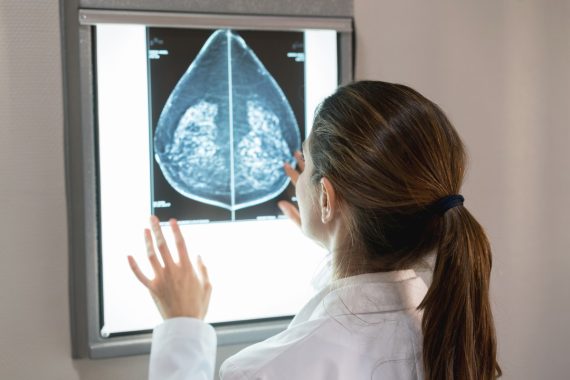Trust reports 40-day indicative waits for urgent breast cancer referrals

A London CCG has informed GPs of urgent cancer referral waiting times of up to 40 days, advising them to ‘have conversations’ with patients about ‘the best place to refer them for care’.
The NHS England maximum waiting time standard for suspected cancer is 14 days but NHS North Central London CCG told GPs that waits for suspected breast cancer referrals currently range from 22 days upwards across five hospitals in London.
North Middlesex University Hospital reported a 40-day wait for urgent breast cancer referrals.
North Central London CCG’s communication said it was ‘encouraging’ that two-week wait referral numbers have recovered to pre-pandemic levels.
However, it said this had ‘unfortunately led to pressures in some services with some of our patients waiting significantly longer for their first appointments, diagnosis and treatment than we would like’.
It added: ‘NHS organisations across NCL are working collaboratively in order to see and treat as many patients as possible, in a timely manner. Despite this the system continues to face significant pressure.’
In response, the CCG ‘will be sharing the indicative waiting times for first appointments for high volume specialities, or those with elevated demand’, the CCG said.
It said this would include ‘breast, colorectal, gynae, head & neck, skin, urology & sarcoma’ for now, and be published ‘to support GPs having conversations with their patients about the best place to refer them for care, and enable them to make an informed decision’.
The latest update published by the CCG shows waiting times for suspected breast cancer as:
- 40 days at North Middlesex University Hospital
- 28 days at Whittington Health Hospital
- 27 days at University College London Hospital
- 22 days at Royal Free London and Barnet and Chase Farm Hospitals
And waiting times for suspected skin cancer as:
- 26 days at Barnet and Chase Farm Hospital
- 21 days at Royal Free London Hospital
- 15 days at University College London Hospital
- 14 days at North Middlesex University Hospital
- 14 days at Whittington Health Hospital.
The CCG said that it was ‘committed to delivering fair access to high-quality care and outcomes for local people,’ adding that they would update the indicative waiting times regularly.
It said that the process had been trialled using breast and skin specialities but would be extended to include the additional specialities noted above ‘in due course’.
NHS England guidance states that patients have a legal right to ask to be seen or treated by a different provider if they are likely to wait longer than the maximum waiting time specified for their treatment – but it says the onus on offering an alternative place of treatment should be on the hospital or CCG rather than the GP.
‘The hospital or CCG will have to investigate and offer you a range of suitable alternative hospitals or clinics that would be able to see you sooner,’ the guidance adds.
A spokesperson for NCL CCG said: ‘The NHS in North Central London is working extremely hard to minimise the impact of COVID-19 on routine care, and is continuing to prioritise urgent care for patients including cancer.
‘We are monitoring cancer waiting times very closely and hospitals are working in partnership to diagnose and treat patients as quickly and equitably as possible – action includes staff working across different hospital sites, protecting and opening new diagnostic facilities, operating additional clinics at multiple sites at evenings and weekends, and working with GPs to even out referrals between providers.’
Dr Michelle Drage, chief executive of Londonwide LMCs, said: ‘Patients with suspected cancer should be able to rely on the Government’s promise of a two-week wait. The stress for patients of being offered a hospital appointment later than two weeks means yet more pressure on them.
‘It also means more pressure on practice staff and GPs who not only have to hold the clinical risk, but also spend additional time managing enquiries from worried patients seeking further reassurance and help to expedite delayed hospital appointments.’
She added that GPs ‘know that if patients are seen quickly when cancer is suspected it can have a significant positive impact on their treatment and the eventual outcome’ and that ‘London’s practices have continued to prioritise appointments and referrals for suspected cancer throughout the pandemic’.
In November, NHS North Central London CCG set out an aim to cut GP referrals by 65% across seven major hospital trusts through ‘advice and guidance’ (A&G) services.
Portfolio careers
What is the right portfolio career for you?

Visit Pulse Reference for details on 140 symptoms, including easily searchable symptoms and categories, offering you a free platform to check symptoms and receive potential diagnoses during consultations.
Related Articles
READERS' COMMENTS [1]
Please note, only GPs are permitted to add comments to articles













The transient Sarah Harding effect.